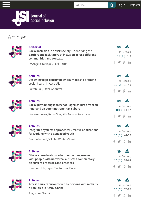
Journal of Social Inclusion
Scope & Guideline
Exploring the Intersection of Social Sciences and Justice
Introduction
Aims and Scopes
- Social Inclusion in Vulnerable Populations:
The journal consistently focuses on issues faced by marginalized groups, including people with disabilities, ethnic minorities, and economically disadvantaged individuals, highlighting barriers to inclusion and proposing actionable solutions. - Health and Wellbeing:
Research published in the journal often investigates the links between social inclusion and health outcomes, exploring how exclusion affects mental and physical health in various communities. - Advocacy and Policy Analysis:
The journal includes studies that assess the effectiveness of advocacy strategies and policy frameworks aimed at promoting social inclusion, providing insights into best practices and areas for improvement. - Qualitative and Mixed Methods Research:
A significant portion of the journal's publications employs qualitative methodologies, including interviews and case studies, to capture the lived experiences of individuals and communities affected by social exclusion. - Cultural and Contextual Factors:
The journal examines how cultural contexts shape experiences of inclusion and exclusion, particularly in diverse settings and among various demographic groups.
Trending and Emerging
- Gender-Based Violence and Inclusion:
There is a growing emphasis on understanding the intersections of gender-based violence and social inclusion, particularly in marginalized communities, highlighting the need for targeted interventions and support services. - Health Disparities and Access:
Research on health disparities faced by marginalized groups has gained traction, focusing on barriers to healthcare access and the impact of social inclusion on health outcomes. - Intersectionality in Social Inclusion:
An increasing number of studies are addressing intersectionality, exploring how overlapping identities (e.g., race, gender, disability) affect experiences of social exclusion and inclusion. - Community Resilience and Support Systems:
Emerging themes focus on community resilience, exploring how social support networks contribute to the well-being of marginalized populations, particularly in times of crisis. - Cultural Competency in Inclusion Practices:
The journal is increasingly publishing work that addresses cultural competency in social services and inclusion practices, recognizing the importance of culturally sensitive approaches to fostering social inclusion.
Declining or Waning
- Digital Inequality:
Research addressing the impact of digital divides and technology access on social inclusion has decreased, suggesting a potential waning interest or a shift towards more pressing social issues. - Economic Diversity:
Topics specifically focused on economic diversity as a standalone theme have become less frequent, possibly indicating that discussions have evolved to integrate economic aspects within broader social inclusion narratives. - Youth-Centric Studies:
While youth-related research remains important, studies specifically targeting youth issues in isolation have diminished, reflecting a shift towards more holistic approaches that include intergenerational perspectives. - Environmental Factors in Inclusion:
Explorations of environmental influences on social inclusion are appearing less frequently, suggesting that while important, this theme may not be as central to current discussions within the journal. - Geopolitical Contexts:
The exploration of geopolitical issues affecting social inclusion has seen a decline, indicating a potential narrowing of focus towards more localized or specific community issues.
Similar Journals

Cadernos Brasileiros de Terapia Ocupacional-Brazilian Journal of Occupational Therapy
Fostering Innovation in Occupational Therapy PracticesCadernos Brasileiros de Terapia Ocupacional-Brazilian Journal of Occupational Therapy (ISSN: 2526-8910) is a distinguished academic journal published by CUBA EDITORA in Brazil, dedicated to advancing research and practices in the fields of occupational therapy and rehabilitation. As an Open Access journal since 2009, it fosters wide dissemination of knowledge, allowing researchers, professionals, and students to access valuable content without barriers. The journal holds a meaningful position in the academic landscape, categorized in the Q3 quartile for Education, Health (social science), and Occupational Therapy as of 2023, underscoring its impact within these domains. With its ranking among the leading publications in its field, amidst a growing body of literature, Cadernos Brasileiros de Terapia Ocupacional serves as a vital platform for disseminating innovative research that contributes to the understanding of occupational therapy practices and their implications on health and education. Researchers aiming to publish high-quality studies in these areas can benefit from the journal’s commitment to scholarly excellence and knowledge dissemination.

Acciones e Investigaciones Sociales
Illuminating Pathways to Social UnderstandingAcciones e Investigaciones Sociales is a prominent journal dedicated to the field of social sciences, published by the UNIV ZARAGOZA, ESCUELA UNIV ESTUDIOS SOCIALES. Since its inception in 1991, this open access journal has fostered scholarly exchange by making research widely accessible, ensuring that insights into social issues reach a broad audience of researchers, professionals, and students. With the ISSN 1132-192X and E-ISSN 2340-4507, the journal aims to publish high-quality research articles, reviews, and case studies that contribute to the understanding and advancement of social sciences. The journal is housed in Zaragoza, Spain, and serves as a key resource for those interested in innovative research methodologies and interdisciplinary collaboration within the social sciences. By emphasizing quality and accessibility, Acciones e Investigaciones Sociales stands as a vital platform for cutting-edge research and meaningful dialogue in the field.
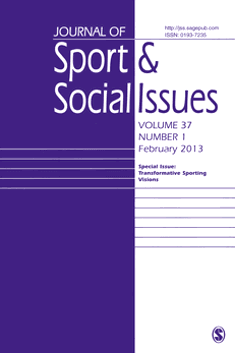
JOURNAL OF SPORT & SOCIAL ISSUES
Advancing Insights at the Intersection of Sport and Social ChangeWelcome to the JOURNAL OF SPORT & SOCIAL ISSUES, a leading academic publication that serves as an essential platform for scholarly discourse at the intersection of sports, sociology, and political science. Published by SAGE PUBLICATIONS INC, this esteemed journal, with an ISSN of 0193-7235 and E-ISSN of 1552-7638, has been instrumental in promoting groundbreaking research since its inception in 1977. With a prestigious Q1 ranking in both Sociology and Political Science in the latest 2023 category quartiles, the journal ranks at an impressive #173 out of 1466 in the Scopus metrics, placing it in the 88th percentile among its peers. The journal's objectives include exploring the complex societal influences on sports and the role of sports in social change, making it a vital resource for researchers, professionals, and students alike. Although it does not currently offer open access options, the high-impact nature of its contributions ensures that findings reach a broad audience within academia and beyond. Join us in advancing the study and understanding of sport in a sociopolitical context.

Social Justice Research
Advancing the Discourse on Equity and JusticeSocial Justice Research, published by SPRINGER, is a premier academic journal dedicated to the exploration of social justice issues spanning multiple disciplines, including anthropology, law, sociology, and political science. Established in 1987, the journal plays a crucial role in advancing scholarly dialogue and understanding of social justice themes, addressing contemporary challenges and theoretical frameworks. With an exceptional Q1 ranking in major categories and impressive Scopus rankings—#115 in Law and #64 in Anthropology—this journal underscores its significance in contributing to a deeper understanding of equity and justice in society. Although it operates on a traditional access model, it serves as an essential resource for researchers and professionals seeking rigorous analyses and innovative perspectives in these critical fields. As the journal continues through its converged years into 2024, it remains committed to fostering an environment that reflects diversity, inclusivity, and impactful scholarship, making it a vital platform for both seasoned academics and emerging scholars motivated to address pressing social issues.

Health and Human Rights
Empowering voices for health equity and justice.Health and Human Rights is a prestigious, open-access journal published by Harvard University Press, focusing on the intersection of health, human rights, and social justice. Since its inception in 1994, the journal has established itself as a leading platform for scholarly discourse, featuring articles that critically analyze the impact of political, social, and economic factors on health outcomes globally. With an impressive Q1 ranking in both the Health (Social Science) and Political Science and International Relations categories, as well as Sociology, it holds a significant place in the academic landscape, attracting a diverse range of contributors and readership. The journal’s commitment to open access since 2008 ensures that its valuable insights are readily available to researchers, professionals, and advocates worldwide, promoting informed dialogue and action in the fields of global health and human rights. With an impressive impact factor and high Scopus rankings, Health and Human Rights is indispensable for anyone involved in social justice, health policy, and advocacy.
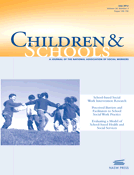
Children & Schools
Nurturing knowledge to support children's development.Children & Schools, published by Oxford University Press, serves as a vital academic journal that bridges the fields of education and social health, demonstrating its importance in addressing the multifaceted challenges facing children in educational settings. With an ISSN of 1532-8759, this journal is committed to disseminating high-quality research from 1978 to the present, marking its influential position as a Q2 ranked journal in both Education and Health (social science) categories as of 2023. The journal's engaging content reflects its dedication to advancing knowledge and practice within these critical areas, appealing to researchers, educators, social workers, and policymakers alike. It is especially noted for its accessibility through robust scholarly contributions, making it a pivotal resource for understanding the developmental and social needs of children in schools. As a member of the Scopus rankings, boasting a 70th percentile in Education and a 63rd percentile in Health (social science), Children & Schools remains essential for advancing research and best practices in nurturing the educational environment for children.
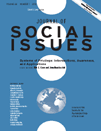
JOURNAL OF SOCIAL ISSUES
Unraveling Critical Social ChallengesJOURNAL OF SOCIAL ISSUES, published by Wiley, has long been recognized as a cornerstone in the realm of social sciences, aiming to address critical and emerging issues affecting our society. With an impressive impact factor and a Q1 ranking in the field, this journal is positioned as one of the top venues for researchers and scholars, boasting a rank of #6 out of 275 in General Social Sciences, placing it in the 98th percentile. Established in 1945, it continues to provide a platform for rigorous scholarly discourse, focusing on the intersection of social issues and policy-making, psychological dimensions, and community engagement. The journal features a broad scope, appealing to a diverse audience of professionals and students interested in qualitative and quantitative research. Although it is not an open-access publication, readers can access a wealth of invaluable insights and research findings that contribute to the advancement of knowledge and practice in the social sciences. Join a community dedicated to unraveling and critically examining the pressing social issues of our time through the pages of this esteemed journal.
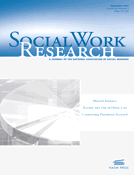
SOCIAL WORK RESEARCH
Connecting theory to practice in social work research.SOCIAL WORK RESEARCH, a premier journal published by Oxford University Press Inc, plays a pivotal role in advancing knowledge in the fields of social work, sociology, and political science. Established in 1994, this journal has successfully bridged critical research across multiple dimensions of social issues, benefiting both practitioners and scholars alike. With a commendable Q3 ranking in Social Work and a Q2 ranking in Sociology and Political Science as of 2023, it maintains a robust position within the academic community, emphasizing empirical rigor and innovative methodologies. Researchers and professionals can access a wealth of original studies, comprehensive reviews, and theoretical discussions that strive to influence practice and policy. Although it does not offer open access, the journal remains accessible to subscribers, ensuring a continuous flow of cutting-edge research to conquer real-world challenges. As it looks towards its converged years through 2024, SOCIAL WORK RESEARCH is set to remain an essential resource for anyone dedicated to understanding and improving social conditions.

SCHOOL PSYCHOLOGY REVIEW
Elevating Standards in Developmental and Educational PsychologySCHOOL PSYCHOLOGY REVIEW, published by Taylor & Francis Inc, is a premier academic journal dedicated to advancing the field of psychology, particularly in developmental and educational contexts. With its E-ISSN of 2372-966X, this journal provides a platform for innovative research and discussion surrounding critical issues in school psychology, making significant contributions to both theory and practice. With an impressive Q1 ranking in both Developmental and Educational Psychology and Education categories for 2023, it stands out among over 1,500 journals in its field, showcasing its commitment to high-quality scholarship. Although not an Open Access publication, SCHOOL PSYCHOLOGY REVIEW remains pivotal for researchers, educational professionals, and students seeking to deepen their understanding of psychological principles applied in educational settings. Join a community at the forefront of research, and explore articles that inform practice and policy in school psychology through this highly regarded journal.
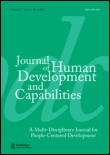
Journal of Human Development and Capabilities
Advancing the frontiers of human potential.The Journal of Human Development and Capabilities, published by Routledge Journals, Taylor & Francis Ltd, is a prestigious platform dedicated to advancing the discourse around human development and capabilities. With its ISSN 1945-2829 and E-ISSN 1945-2837, this journal focuses on interdisciplinary research that combines insights from anthropology, development studies, and social sciences, which are highlighted by its notable Q1 ranking in both field categories as of 2023. As a vital resource for researchers, professionals, and students, it offers a rigorous examination of theories, frameworks, and empirical studies that shape our understanding of human potential and well-being. Although it does not operate on an open access model, readers can access its significant contributions from libraries and institutions. Covering a converged period from 2009 to 2024, the journal consistently ranks highly in Scopus, currently positioned at #84 out of 306 in Social Sciences Development, marking it as a leading source for innovative and impactful research.